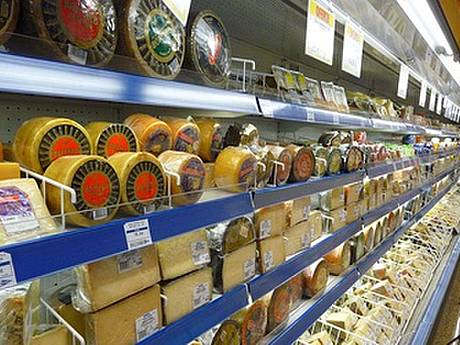
Less than four months remain until the introduction of a Deep and Comprehensive Free Trade Area (DCFTA) with the European Union (EU), however, Ukrainian economy's preparedness for this important moment could be better, Head of the Anti-Crisis Council of Non-Governmental Organizations and President of the Ukrainian League of Industrialists and Entrepreneurs (ULIE) Anatoliy Kinakh said.
"The main problem of the domestic sector of economy is the low competitiveness of our products on the European market. It is necessary to upgrade industries and adjust technical regulations and standards. The ULIE and the Anti-Crisis Council of Non-Governmental Organizations have been asking the government to draw up a national program of adjusting the Ukrainian economy to the conditions of free trade with the EU (standards, technical regulations, modernization) for a long time in order to integrate in one document numerous components of the successful presence of Ukrainian producers on the European market, but it has not been elaborated yet," Kinakh said.
It is important to develop investment policy that would allow for spending significant assets on the modernization of production and technologies without risks for investors. The Cabinet of Ministers and the National Bank of Ukraine (NBU) should launch joint programs to open up access to credits for industries and an encouraging taxation policy is also necessary. The country has to develop a strong export policy starting with lifting restrictions on currency transactions introduced by the NBU and ending with lobbying diplomatic, political, and information events.
Ukrainian businessmen are seriously concerned about the facts that the country's exports to the EU fell 36% in the first half of 2015 as compared to the same period last year and commodity flows to Europe increased by merely 2.6% in 2014 despite the trade preferences introduced unilaterally by the EU.
Non-compliance with European safety standards, delays with certification, the lack of information on the peculiarities of entering the EU market (marketing, market overviews, competitive and effective system of sales) became the reason for which many domestic enterprises had a chance but failed to use opportunities provided by the EU's trade preferences. According to the Agrarian Policy and Food Ministry of Ukraine, many tariff quotas on supplies of Ukrainian products to the EU were not used in 2014. Quotas on supplies of pork, beef, lamb, eggs, milk and dairy products were not used at all, while quotas on supplies of chicken were used only by a third. Only quotas on supplies of maize, wheat, honey, fruit juices were used completely.
The upcoming introduction of the DCFTA also exacerbates the situation because the opening of trade borders will let many EU products enter Ukraine, as a result of which competition on the domestic market will escalate. Industrialists demand that the Anti-Crisis Program of Joint Actions of the Government and Businesses establish an effective dialogue aimed at the development of measures (taxation, investment) to stimulate the modernization of domestic production facilities, protect the domestic market from oversaturation with imported goods and introduce import substitution, ensure gradual liberalization of the market via the introduction of a transition period and protective measures for Ukrainian producers that would not contradict the conditions of the launch of the DCFTA between Ukraine and the EU.
According to Kinakh, the ULIE Office in Brussels, having gained the support of the EU, proposes allocating EU grants to Ukraine for the creation of modern European certification centers to be accredited in the EU, which would issue European certificates. He also said that the ULIE was seeking preferences for Ukrainian producers for participation in landmark exhibitions and forums that are held in the EU and for the expansion of access to participation in public procurements in the EU, etc. Ukrainian businesses also propose to revise Eastern Partnership mechanisms in order to ensure that enterprises directly receive a bigger part of the EU's financial aid and business development grants.
"Public diplomacy will bring results for sure, but today, when not much time remains until the introduction of the DCFTA, the government's goal-oriented actions for the support of Ukrainian businesses' position in the EU and the development of a modern high-quality export policy in Ukraine are necessary as never before. We have to use our chance to enter the EU's huge market with 500 million consumers and GDP worth around EUR 14 trillion," Kinakh said.